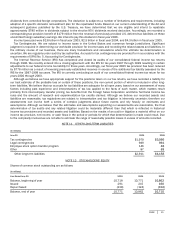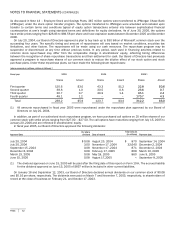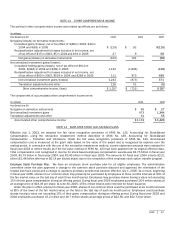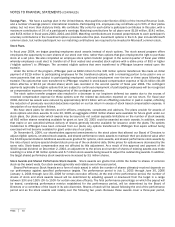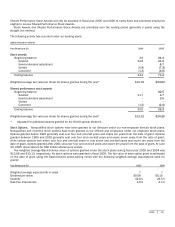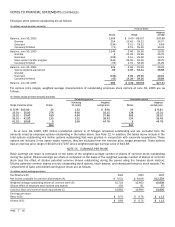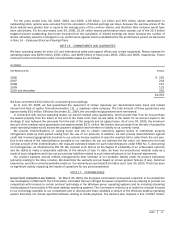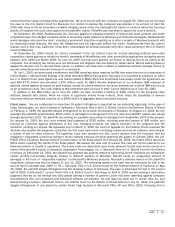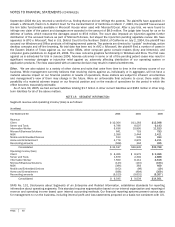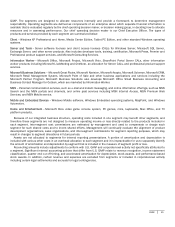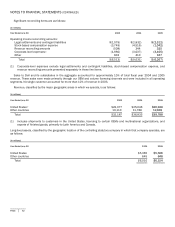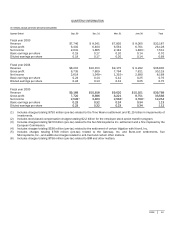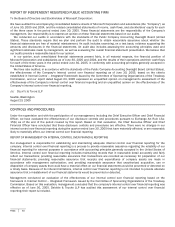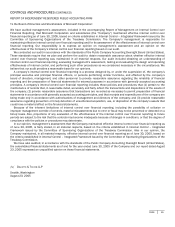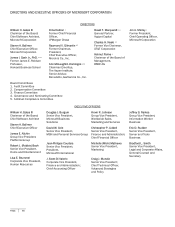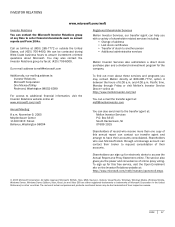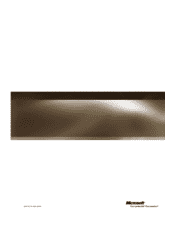Microsoft 2005 Annual Report Download - page 60
Download and view the complete annual report
Please find page 60 of the 2005 Microsoft annual report below. You can navigate through the pages in the report by either clicking on the pages listed below, or by using the keyword search tool below to find specific information within the annual report.
PAGE 59
(and productivity suites including these applications). We were served with the complaint on August 30, 2004 and we removed
the case to the U.S. District Court for Maryland. Our motion to dismiss the complaint was granted in its entirety on April 18,
2005 with leave to file an amended complaint alleging claims under the Cartwright Act based on conduct within the four-year
statute of limitation the court ruled applies to the plaintiffs’ claims. Plaintiffs also may seek to appeal the court’s decision.
On December 18, 2003, RealNetworks, Inc. filed suit against us alleging violations of federal and state antitrust and unfair
competition laws. The alleged violations relate to streaming media features of Windows and related technologies. RealNetworks
seeks damages and injunctive relief, including a permanent injunction requiring us to offer a version of Windows products with
no streaming media features. We deny the allegations and will vigorously defend the action. RealNetworks filed the case in
federal court in San Jose, California. It has been consolidated for pretrial purposes with other cases pending in the U.S. District
Court for Maryland.
On November 12, 2004, Novell, Inc. filed a complaint in the U.S. District Court for in Utah asserting antitrust and unfair
competition claims against us related to Novell’s ownership of WordPerfect and other productivity applications during the period
between June 1994 and March 1996. On June 10, 2005, the trial court granted our motion to dismiss four of six claims of the
complaint. The remaining two claims were not dismissed and litigation has proceeded on those claims. We are seeking leave to
appeal the decision not to dismiss those claims. In addition, we have been notified of additional antitrust damage claims by
several competitors and several licensees of our products.
On July 1, 2005, we announced a settlement with IBM resolving claims asserted by IBM that arose from the circumstances of
United States v. Microsoft and findings of fact that identified IBM as having been impacted in its business by practices on which
the U. S. District Court ruled against us, and claims related to IBM’s OS/2 and SmartSuite businesses. Under the agreement, we
paid IBM $775 million and extended a $75 million credit for IBM’s internal deployment of our software. IBM released all
antitrust claims against us based on past conduct except for claims related to its server business as to which IBM will not sue
us for at least two years. The costs related to this settlement were accrued in other current liabilities as of June 30, 2005.
In addition to the IBM matter, as of June 30, 2005, we have recorded a liability of $455 million for the foregoing other
antitrust lawsuits and claims. While we intend to vigorously defend those matters, there exists the possibility of adverse
outcomes which we estimate could be up to $400 million in aggregate beyond recorded amounts.
Patent cases. We are a defendant in more than 35 patent infringement cases that we are defending vigorously. In the case of
Eolas Technologies, Inc. and University of California v. Microsoft, filed in the U.S. District Court for the Northern District of Illinois
on February 2, 1999, the plaintiffs alleged infringement by the browser functionality of Windows. On August 11, 2003, the jury
awarded the plaintiffs approximately $520 million in damages for infringement from the date the plaintiffs’ patent was issued
through September 2001. The plaintiffs are seeking an equitable accounting for damages from September 2001 to the present.
On January 14, 2004, the trial court entered final judgment of $565 million, including post-trial interest of $45 million, and
entered an injunction against distribution of any new infringing products, but stayed execution of the judgment and the
injunction pending our appeal. We appealed and on March 2, 2005 the Court of Appeals for the Federal Circuit reversed the
decision and vacated the judgment, ruling that the trial court had erred in excluding certain previous art evidence and ruling as
a matter of law on other evidence. The appellate court also reversed the trial court’s decision that the inventors had not
engaged in inequitable conduct by failing to reveal material previous art while obtaining the patent. In October 2003, the U.S.
Patent Office initiated a Director-ordered re-examination of the Eolas patent. On February 26, 2004, the Patent Office issued an
Office Action rejecting the claims of the Eolas patent. We believe the total cost to resolve this case will not be material to our
financial position or results of operations. The actual costs are dependent upon many unknown factors such as the events of a
retrial of the plaintiff’s claims. In Research Corporation Technologies, Inc. v. Microsoft, filed in U.S. District Court for the District
of Arizona on December 21, 2001, the plaintiff has asserted two patents related to half-toning, which it believes are infringed by
certain printing functionality allegedly present in different versions of Windows. Plaintiff seeks an unspecified amount of
damages in the form of “reasonable royalties” on Microsoft’s Windows products. Microsoft’s defense based on the plaintiff’s
inequitable conduct was tried on August 11 and 12, 2005. The remaining issues in the case may be scheduled for trial in the
second half of calendar year 2005. In TVI v. Microsoft, filed in U.S. District Court for the Northern District of California on May
16, 2002, the plaintiff alleges infringement by the Autoplay feature of Windows. The case is scheduled for trial in the second
half of 2005. In Microsoft v. Lucent, filed in the U.S. District Court in San Diego on April 8, 2003, we are seeking a declaratory
judgment that we do not infringe any valid patent among a number of patents Lucent has been asserting against computer
manufacturers who sell computers with Microsoft software pre-installed. No trial date has been set. In Arendi USA, Inc. and
Arendi Holding Limited v. Microsoft, filed in U.S. District Court for the District of Rhode Island on July 31, 2002, the plaintiffs
alleged infringement of one patent by certain Smart Tags features in Microsoft Office XP and Office 2003. Following trial in




